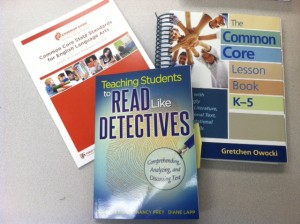 My summer externship has probably been very different from most. While not connected to an outside business…I’m actually connected to the Department of Public Instruction. This has afforded me the opportunity to work with so many teachers that are excited about the possibilities of public instruction and the changes common core has brought to the table in literacy. We have been forced to ask some pretty tough questions about instruction in our classrooms and by asking those questions and making adjustments to align with the three major shifts in Common Core we will begin to see an entirely new level of achievement from our students.
My summer externship has probably been very different from most. While not connected to an outside business…I’m actually connected to the Department of Public Instruction. This has afforded me the opportunity to work with so many teachers that are excited about the possibilities of public instruction and the changes common core has brought to the table in literacy. We have been forced to ask some pretty tough questions about instruction in our classrooms and by asking those questions and making adjustments to align with the three major shifts in Common Core we will begin to see an entirely new level of achievement from our students.
What are the three shifts?
- Building knowledge through content rich nonfiction and informational texts. That doesn’t mean we forget about the rich literature that our students need to read…but that we make sure we incorporate just as much informational text. Informational text is the language of our world…it’s found in text books, on college applications, in manuals, and in news articles. The skills for reading informational text do vary from reading literature and so we must equip our students with those skills in order to make sure they are successful in our society.
- Reading and writing grounded in evidence from the text. Writing…seems almost like a forgotten art form. With the demands of high stakes testing it was inevitable that writing would take a back seat. With Common Core we must embrace the importance of writing. And we must make sure that writing is not a separate component. It must be taught hand in hand with literacy. Teachers must ask students questions that require them to return to the text. They need to become used to proving their answers. They will have to read the text closely to draw inferences.
- Regular practice with complex text and its academic vocabulary. Teachers must also focus on the growing complexity of texts. This is forcing teachers to reevaluate the level of the texts in their classroom and make sure they are appropriately challenging and then finding ways to scaffold instruction so that all students have access to that same challenging text. This is also the shift that focuses on the need to teach vocabulary in a clear and systematic way.
So making connections between my externship and my curriculum will be a piece of pie!!!
Patricia, “Piece of Pie” as a title made me smile because I think this sounds like a tall order!
You alluded to the idea that students are not writing as much anymore. I think reading texts as well as writing are becoming lost to the Twitter and texting language our students currently use. We only write short blurbs on our Facebook pages and if we need an answer, just Google it! As much as technology is changing the way we think and learn, we must remember that it is only a tool. To address Common Core expectations in all subject areas, there will be a happy marriage between technology, classic written text and the latest resources on the internet. Sounds like you’re on your way to using all of this at DPI. Once your lessons are complete, we can all use them to make it a “Piece of Pie”!
This is a great reflection of your externship experience so far. It’s not a traditional “industry-education” Fellowship but the DPI Fellowships are critical to the advancement of education in NC. Thank you to all of you for tackling this very important task.
Hello Patricia,
I very much enjoyed your outline of three major shifts in literacy due to the implementation of the Common Core for ELA. I am onboard and aware of the shift from focusing on literature to the importance of informational reading and writing. It seems such a necessity for every worker from the clerk at the auto parts store who has to read so much online about parts, ordering, etc. to the person seeking up-to-date information on the Edward Snowden case. It seems that as a society, we are reading more than ever albeit for different purposes than understanding works such as A Tale of Two Cities.
Are the other two shifts you mention being / going to be emphasized across all disciplines? I think that K – 12 people accept that we are all reading and writing teachers.. at least at some level. BUT, will the two shifts you mention be part of the roll-out of supporting the Common Core? I get bogged down sometimes in the lengthy anchor statements for reading and writing. A push for finding evidence in the text and broadening academic vocabulary seems very tangible and measurable.
Question – Can you comment also on the importance of the Listening and Speaking standards in Common Core ELA? I don’t hear them mentioned much.
Thanks again for your succinct post and summary.
Donna